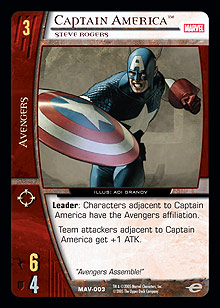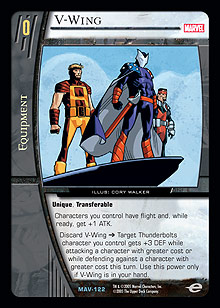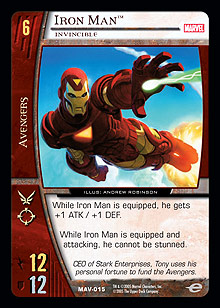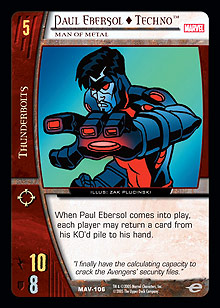
Most of you probably had your first Avengers experience this weekend. Mirroring these community events, UDE had its own internal Sealed Deck prerelease over the weekend. What better time in which to renew my lifelong vendetta with Ben Seck? Unlike Booster Draft, Sealed Deck focuses on deck building and exploiting small synergies among cards that you normally would not think about playing together. Here’s a breakdown of the cards that I opened.
Avengers
 Rick Jones
Rick Jones
Dane Whitman
Falcon x2
Captain America, Steve Rogers
Hank Pym, Yellowjacket
Carol Danvers
Iron Man, Tony Stark
Vision
Iron Man, Invincible
Thor, God of Thunder
Masters of Evil
Yellowjacket, Rita Demara
Radioactive Man
Nathan Garrett
Tiger Shark
Marcus Daniels à Blackout, Darkbringer
Whirlwind
Mr. Hyde
The Wrecker
Thunderbolts
Joystick
Melissa Gold
Paul Ebersol à Techno, Gadgeteer
Helmut Zemo à Citizen V, Tactician
Plant Man
Paul Ebersol à Techno, Man of Metal
Hawkeye, Leader by Example
Beetle à Mach 4, New Team Leader
Squadron Supreme
Thermite
Inertia
Blue Eagle
Nighthawk
Hyperion, Mark Milton
Hyperion, Sun God
Kang
Kang’s Guards
Kang, Earth Mesozoic
Kang, Ultimate Kang
Tempus x2
Kang, Lord of Limbo
Other
Mammomax
Lady Punisher x2
White Tiger
Hitman
Avengers
Repel Attack
Avengers Mansion
Playroom
Masters of Evil
Evil Reborn
Mystic Summons x2
The Wrecking Crew x2
Thunderbolts
 Deadly Conspiracy
Deadly Conspiracy
Win-Lose Deal
V-wing
Squadron Supreme
Answer the Call
Eldritch Power
Hibernaculum
Supply Line
Airskimmer
Team-Ups
Supreme Sanction
Justice for All
Generic
Heroes in Reserve
Shrink
War of Attrition
Might Makes Right
Call to Arms
United We Stand
Force Field Belt
Framistat
Picking the Teams
If you’re interested in building your own decklist before I get into the details of my own, then do so now.
 Some of the notable cards that influenced the way I built this deck included , Heroes in Reserve, Supply Line, Avengers Mansion, and Carol Danvers. The main recurring themes for Avengers Sealed Deck, like reservists, equipment, and no cards in hand, tend to pull your deck in different directions. For every Sealed Deck, each of these themes is present to a degree.
Some of the notable cards that influenced the way I built this deck included , Heroes in Reserve, Supply Line, Avengers Mansion, and Carol Danvers. The main recurring themes for Avengers Sealed Deck, like reservists, equipment, and no cards in hand, tend to pull your deck in different directions. For every Sealed Deck, each of these themes is present to a degree.
It’s important to compare the rewards for running each of these themes with your ability to consistently reach the game state where you can gain these rewards. For the aforementioned themes, this can be as simple as counting the number of playable reservists, equipment, and discard-costed cards you have. It’s also critical to recognize subtle differences between cards. For example, Avengers Mansion requires face-down Avengers characters, whereas Heroes in Reserve and Pym Laboratories require face-down reservist characters.
The most influential card I opened was Avenger’s Mansion. Playing this card basically meant that I had to play as many Avengers characters as possible, since no Team-Up cards granted team affiliations to character cards in the resource row. Fortunately, pound for pound, the Avengers are easily the most playable team in Booster Draft. Their characters tend to be at least average in stats with independently powerful abilities.
The two copies of Falcon provided a strong incentive to include as many 3- and 4-cost leader characters as possible, while Hank Pym and Iron Man, Invincible provided strong arguments for playing equipment cards. Looking through the characters in the other teams, Thunderbolts offered a 3-cost leader to work alongside Falcon, plus a strong 5-cost leader in Hawkeye, while the Squadron Supreme added Nighthawk to support the equipment theme and another “can’t be stunned while attacking” effect with Hyperion, Mark Milton.
Unsurprisingly, the Masters of Evil had little to add besides some reservists and resource payment powers that had no non-character support. Kang was obviously too busy fighting with versions of himself to offer any synergy to the other teams. These considerations pointed to playing Avengers and Squadron Supreme as the main teams, with Thunderbolts and other characters to fill in the gaps. The main card to support was Avengers Mansion, as well as supporting the overall equipment theme. This created an initial character curve that looked like this:
Cost 1: Rick Jones
Cost 2: Dane Whitman, Falcon x2
Cost 3: Captain America, Steve Rogers, Helmut Zemo à Citizen V, Tactician
Cost 4: Iron Man, Tony Stark, Carol Danvers, Blue Eagle
Cost 5: Nighthawk, Hawkeye
Cost 6: Iron Man, Invincible, Vision, Hyperion, Mark Milton
with the remaining characters in the card pool to fill in gaps:
Cost 3: Hank Pym, Yellowjacket, Plant Man, Inertia, Mammomax
Cost 4: Lady Punisher x2
Cost 5: Paul Ebersol à Techno, Man of Metal, White Tiger, Hitman
Cost 7: Beetle à Mach 4, New Team Leader, Kang, Lord of Limbo
Cost 8: Thor, God of Thunder, Hyperion, Sun God
 The most interesting decision was between playing Paul Ebersol à Techno, Man of Metal and including either his 2-cost copy or instead going with White Tiger for his pure stats and invulnerability. Since there were already three excellent 2-drops, there was little justification for Ebersol at two, and his 5-cost version’s 8 DEF made the power-up basically useless on defensive initiatives. Since Supply Line, Shrink and Force Field Belt were not team-stamped for the actual target, White Tiger was the better choice. These selections created a core of 21 characters, meaning it was time to move on to the support cards.
The most interesting decision was between playing Paul Ebersol à Techno, Man of Metal and including either his 2-cost copy or instead going with White Tiger for his pure stats and invulnerability. Since there were already three excellent 2-drops, there was little justification for Ebersol at two, and his 5-cost version’s 8 DEF made the power-up basically useless on defensive initiatives. Since Supply Line, Shrink and Force Field Belt were not team-stamped for the actual target, White Tiger was the better choice. These selections created a core of 21 characters, meaning it was time to move on to the support cards.
Auto-includes: Avengers Mansion, Supply Line, Shrink, Might Makes Right, Call to Arms
1 Repel Attack
1 V-wing
1 Answer the Call
1 Eldritch Power
1 Hibernaculum
1 Airskimmer
1 Supreme Sanction
1 Justice for All
1 War of Attrition
1 United We Stand
1 Force Field Belt
1 Framistat
There were several interesting picks here. Three pieces of essentially 0-cost equipment were added to support Iron Man, Invincible, Nighthawk, and Hank Pym, Yellowjacket. Because of the hard team-stamping of the Squadron Supreme cards, Eldritch Power was a better pump than Airskimmer, since both had to target a Squadron Supreme character and Eldritch Power could be used when on defense. While it was another piece of equipment, Airskimmer should never actually be recruited in this deck. Finally, War of Attrition might prove to be very strong in Sealed Deck, with the prevalence of team-up cards and excellent locations.
Final Cuts
The final incarnation of the deck was only four cards away. Ultimately, I decided to cut Hank Pym, Yellowjacket and the 8-cost Hyperion. With Falcon as a turn-3 tutor with the leader ability, skimping on 3-cost characters was reasonable. With initiative-swinging cards, like leaders Iron Man and Hyperion, it would be rare to have a game last past turn 7. This means that Hyperion, Sun God would only be a power-up for a single 6-drop character. Answer the Call was cut because of its dependency on the team-up. The earliest you’d expect to empty your hand with this deck would be turn 6 or 7, whereas in most cases, I’d want to use Answer the Call many turns before then. I ran out of time before making the final cut and ended up running the following 31-card deck.
Characters: 19
Cost 1: Rick Jones
Cost 2: Dane Whitman, Falcon x2
Cost 3: Captain America, Steve Rogers, Helmut Zemo à Citizen V, Tactician, Inertia
Cost 4: Iron Man, Tony Stark, Carol Danvers, Blue Eagle, Lady Punisher x2
Cost 5: Nighthawk, Hawkeye, White Tiger
Cost 6: Iron Man, Invincible, Vision, Hyperion, Mark Milton
Cost 7: Beetle à Mach 4, New Team Leader
Non-characters: 12
Supply Line
Shrink
Might Makes Right
Call to Arms
Repel Attack
Eldritch Power
Supreme Sanction
War of Attrition
Avengers Mansion
V-wing
Force Field Belt
Framistat
Having played the deck, it’s pretty clear to me which card would have been cut, but I’ll leave that as a question for next article. Meanwhile, my eternal nemesis built his own shining Sealed Deck and faced off against me in a best-of-three match—but you’ll have to tune in next week for Ben’s deck and a quick match summary.